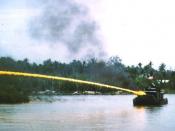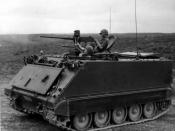The winds of change began to sweep across America in the late fifties. The political unrest came with fear of thermo-nuclear war and the shadow that had been cast by Hiroshima, and Nagasaki (The History Place, 1999). The Civil Rights leaders were unhappy with President Eisenhower's reluctance to use his powers for their cause, in spite of the fact that the nation was becoming more receptive to civil rights reforms. With black organizations becoming more militant, Eisenhower needed to acknowledge the growing movement, and govern accordingly.
World politics were still dominated by the conflict between the capitalist nations, led by the USA, and the Communist countries, led by the USSR. The bonds that were keeping people loyal to their leaders were breaking down. In 1960 there was a major split between Russia and China (The History Place, 1999). The Chinese decided that the Russians were betraying Communism and set off on what they hoped would be the world revolution against capitalism.
During the fifties, the economic situation was in a constant state of growth. The United States were prospering and the government was clinging to the 'golden years.' The rise of the giant corporations had a profound effect on American life. A few hundred corporations controlled much of the nation's industrial and commercial assets and enjoyed a near monopoly in some areas. The mega corporations dominated the seats of economic and political power. They employed millions of workers, a large percentage of whom populated the suburbs that were growing across the country (Think Quest, 1999).
The changing American economy also experienced dramatic shifts in the composition of the work force. Fewer workers went into traditional fields such as manufacturing, agriculture, and mining and more went into clerical, managerial, professional, and service fields. In 1956, for the first time in the...


